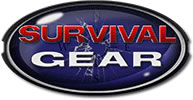What Is In A Survival Kit?
Survival kits are personal things. By that, I mean they should be suited to the individual's life and abilities. You start with the basic needs and satisfy them in a way suitable for yourself. What are those needs?
What Is In A Survival Kit?
Food
Water
Shelter / Warmth
Lighting
First Aid
Hygiene
Entertainment
It doesn't matter if you're referring to a Get Home Bag, an Evacuation Kit, or a Vehicle Emergency Kit, those needs should be satisfied in some way by the survival kit. Let's look at them one at a time.
Food is the fuel for your body. While the average person can live for about three weeks without food, it doesn't take much more than a few days to feel the effects of malnutrition. The ideal foods for a survival kit are those that store well for long periods of time and don't require much in the way of preparation before consuming.
Examples would include things like granola bars, protein bars, crackers, dried fruits, dried nuts, peanut butter, and foil packaged tuna. A survival kit isn't meant to provide you with food to last weeks on end. Rather, it should give you enough fuel to last a few days, until you reach a safe location. With that said, it isn't the worst idea to include supplies to obtain wild food to augment your stored calories. A pocket fishing kit, snare wire, and a good book on wild edible plants will all serve you well.
Water is essential for life. The body can only survive a few days without it. And the latter part of those three days will not be pretty. The problem with storing water in a survival kit is it is heavy. There isn't much you can do to lighten the load, aside from choosing the lightest container you can find. I recommend keeping two 1L bottles in a survival kit, filled with clean water but leaving an inch or two of space for expansion in case it freezes. This will provide enough water for a day or two, depending on climate and circumstances. Be sure to also include in your survival kit the means to filter and purify additional water you may obtain from rivers, streams, and puddles. Water purification tablets store well and take up little space. You may also consider a container in which you can boil water. Toss in a few coffee filters to use to remove sediment and debris from the water before purifying it.
Even in the summer months, it can get cold at night. Every survival kit should have supplies for building expedient shelters as well as lighting fires. An emergency blanket, sometimes called a space blanket, will reflect your body heat back at you and also keep the wind and rain out.
Paracord or some other type of cordage will help tremendously in building a shelter. Rain ponchos are another great item that take up very little space in the survival kit. As for lighting fires, you need to have both a means of creating flame and/or sparks as well as dry tinder. A couple butane lighters, a magnesium striker, and some dryer lint in a zip lock plastic bag will serve you well in that stead.
While lighting may not be absolutely crucial to survival, it sure makes life easier if you are able to see what you're doing. Head lamps are rather inexpensive and with LED bulbs, take up very little space in your survival kit. Flashlights, too should have LED bulbs. They are brighter and use far less energy than the older incandescent ones. Be sure to store extra batteries in your kit. You could also consider picking up a few glow sticks at your local dollar store.
A first aid kit is essential to any survival kit. It should contain, at a minimum, adhesive bandages of assorted sizes, pain relievers such as ibuprofen, antibiotic ointment, tweezers (for removing splinters), burn cream, and elastic bandages for sprains. Medicine for stomach upsets would be an asset as well.
Coupled with first aid is a hygiene kit. Toilet paper, baby wipes, and hand sanitizer will all help you stay clean. Not only is this important for morale purposes but it will reduce the possibility of infection and illness. A toothbrush, toothpaste, and dental floss will help you feel human again.
At first, packing items for entertainment purposes sounds a bit luxurious. But, this is an important component of your survival kit. Having something to do keeps the mind sharper and gives you something to focus on to pass the time. If you are a religious person, consider putting a copy of The Bible or another religious text in your kit. A paperback novel, crossword puzzles, even just a notepad and pencils will help. A deck of cards takes up very little space. A crank powered radio will not only provide you with music but news reports will help keep you informed as to the ongoing situation around you.
A survival kit contains items that satisfy your basic needs until you can reach a safe location. While the needs are the same for everyone, how you satisfy them is a personal choice.
